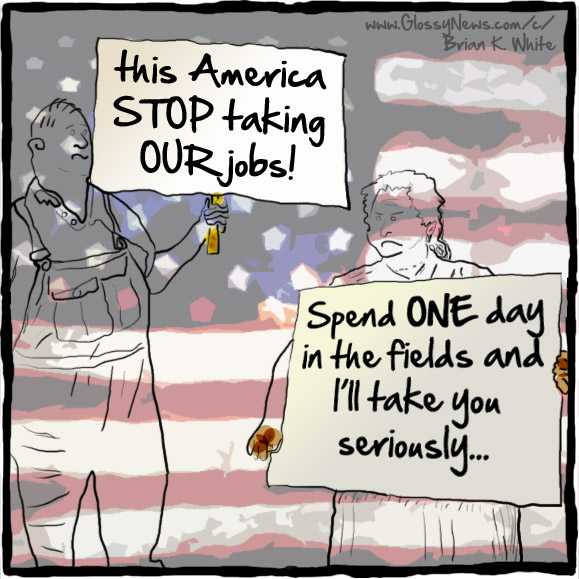
Picture from “Rally in Support of Dreamers/DACA”
What is easier, blaming someone or taking the blame?
If you have answered honestly and depending on the person you are, you most likely said blaming someone. This is true in many cases and at any age. Children will blame their siblings or friends to avoid dealing with consequences and adults will do the same.
A great example and well known example has been this past election, there was a lot of finger pointing and a lot of blaming. The highlight of the whole election was about “making America great again”, how? By deporting all immigrants because they were taking US citizens jobs and money.

Image from “A Day Without Immigrants means”
In the novel Signs Preceding the End of the World the author Yuri Herrera does a great job in describing how difficult it can be to cross the border between the United States and Mexico. Although crossing is a challenge, the real challenge is once you are in America. People cross the borders in hopes of bettering their life’s and providing for their families back home but once they reach the other side they realize that not only will language be a barrier but everything else. In the novel the main character Makina struggles along her journey in America, she deals with many obstacles, but one of the main obstacles seems to be the people. She as an immigrant is accused or blamed of taking what is not hers, of destroying what is not her home. Towards the end of the novel Makina states the following:
“We are to blame for this destruction, we who don’t speak your tongue and don’t know how to keep quiet either … We who came to take your jobs, who dream of wiping your shit, who long to work all hours”. “We, the dark, the short, the greasy, the shifty, the fat, the anemic. We the barbarians” [1]
In this quote we see Makina’s explanation on how immigrants are treated and viewed. Here we can see that immigrants are blamed for taking over what the Americans do not want to do. No one wants to work from sun up to sun down, no one wants to break their backs picking up strawberries and no one wants to be bossed around, but someone has to do it.
Although the novel is fictional these are things that are being dealt with in “real life”, and it was clearly seen in this year’s election. Yet it is easier to point the finger and blame the outsider. The article “Nothing Donald Trump Says on Immigration Holds Up” mentions some quotes that our president stated during the election, and that are statistically proven wrong.
Take a look and see for yourself, the statics will impress you.
[1] Excerpt from: Herrera, Yuri. “Signs Preceding the End of the World.” iBook.

